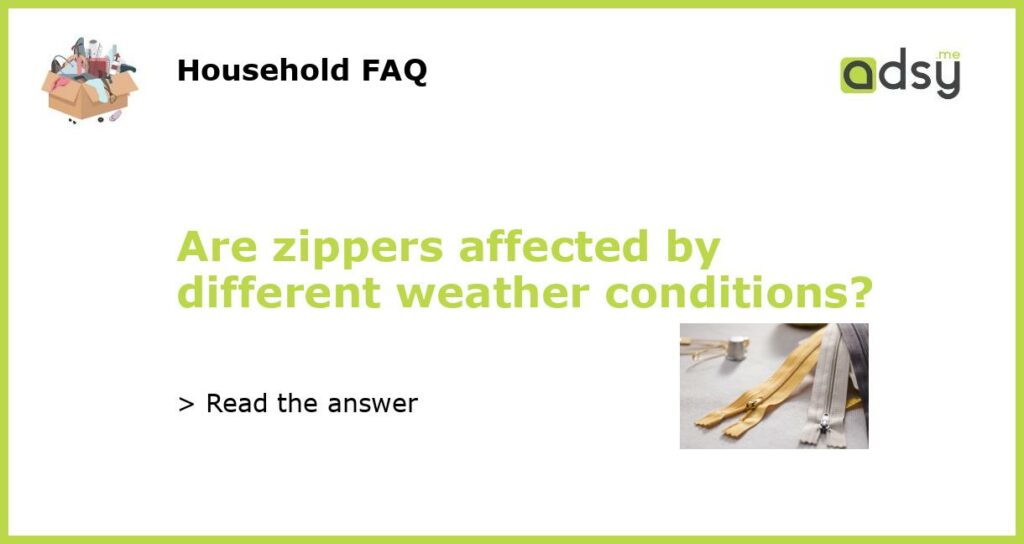Are zippers affected by different weather conditions?
Weather conditions can indeed have an impact on the performance and functionality of zippers. Zippers are commonly used in a variety of products, including clothing, bags, and outdoor gear. While they are designed to provide convenience and durability, certain weather conditions can pose challenges for these fasteners.
How does extreme cold affect zippers?
Extreme cold weather can cause zippers to become stiff and difficult to operate. The metal components of zippers, such as the sliders and teeth, can contract in low temperatures, making it harder to move the slider up and down the teeth. This can be especially problematic for outdoor enthusiasts who rely on zippers to secure their clothing and gear during cold weather activities.
Additionally, when zippers are exposed to extreme cold and then rapidly heated, such as when going from outdoors to a warm indoor environment, condensation can form on the zipper. This moisture can lead to corrosion and damage to the metal components over time. To prevent these issues, it is advisable to keep zippers lubricated with silicone or wax-based zipper lubricants to help maintain smooth operation and protect against moisture damage.
How does heat and humidity affect zippers?
Heat and humidity can also have an impact on zippers, particularly those made with plastic or nylon components. In hot and humid conditions, these materials can become soft and less rigid, which may result in zipper issues such as the slider slipping or not fully closing. This can be a concern for individuals living in tropical or humid climates, as well as those who engage in outdoor activities in such environments.
Furthermore, excessive heat and direct sunlight exposure can cause fading or discoloration of zippers made with synthetic materials. This is mainly relevant for outdoor gear or items that are regularly exposed to prolonged sunlight, such as camping tents or backpacks. Sunscreen, body oils, and other substances can also degrade the integrity of the zipper material, leading to reduced durability and functionality.
Can rain and moisture damage zippers?
It is crucial to consider the impact of rain and moisture on zippers, especially when it comes to water-resistant or waterproof gear. While zippers are often designed to provide some level of water resistance, prolonged exposure to rain or immersion in water can still lead to water penetration and damage.
When water enters the zipper teeth, it can affect the lubrication and cause them to become sticky or corroded over time. This can result in difficulties opening and closing the zipper properly. To help protect zippers from moisture damage, it is recommended to keep them clean and dry, use protective covers or flaps, and regularly apply waterproofing products or treatments specifically designed for zippers and outdoor gear.
Can wind impact the functionality of zippers?
Strong winds can indirectly affect the functionality of zippers by causing fabric or other materials to flap or move vigorously. This can create additional stress on the zipper and potentially lead to misalignment, zipper separations, or even damages to the fabric or gear itself. It is advisable to secure or reinforce items with zippers during windy conditions to help prevent potential issues.
How to maintain zippers in different weather conditions?
Proper care and maintenance are essential to ensure the longevity and smooth operation of zippers in different weather conditions. Here are some tips to maintain zippers:
- Regularly clean zippers to remove dirt, debris, and residue that can affect their functionality.
- Keep zippers lubricated with appropriate zipper lubricants to reduce friction and prevent corrosion.
- Store items with zippers properly, avoiding compression or bending that can stress the fastener.
- When not in use, close zippers completely to prevent exposure to dust, moisture, and other environmental factors.
- Follow the manufacturer’s instructions for care and maintenance specific to the item and its intended use.
By taking proper precautions and addressing specific weather-related challenges, zippers can continue to provide reliable and convenient fastening solutions in a variety of conditions.






